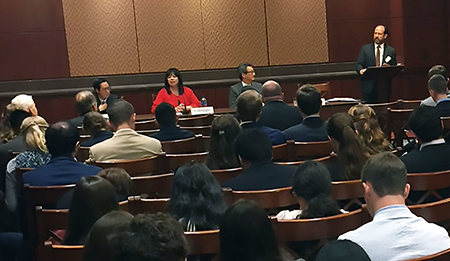"[Arms Control Today] has become indispensable! I think it is the combination of the critical period we are in and the quality of the product. I found myself reading the May issue from cover to cover."
Events and Remarks
 Staff and experts with the Arms Control Association periodically host or participate in events to inform policymakers, journalists, and the public about important developments in arms control.
Staff and experts with the Arms Control Association periodically host or participate in events to inform policymakers, journalists, and the public about important developments in arms control.
If you have any questions about our events or wish to secure a speaker, contact Tony Fleming, Director for Communications, at (202) 463-8270 ext. 110.
Below find remarks by Arms Control Association staff, board members, and experts at recent events.
Moderator - ACA Executive Director Daryl Kimball Speakers- Sidney Drell, Ambassador James Goodby, and Ambassador Tibor Tóth
Transcript available. The Arms Control Association on Thursday, Jan. 20, 2011 hosted the second in a series of briefings on Solving the Iranian Nuclear Puzzle with panelists Barry Blechman, Charles Ferguson, Greg Thielmann and moderated by ACA's Executive Director Daryl G. Kimball. The panel examined what a viable diplomatic solution with Iran would look like and ways to achieve it.
Four years ago, President Barack Obama outlined an action plan to reduce nuclear weapons-related risks. Significant progress has been achieved but momentum has slowed, proliferation problems in North Korea and Iran persist, and the slow-moving arms race in South Asia continues.
The Arms Control Association 2016 Annual Meeting will take place on June 6, 2016 at the Carnegie Endowment for International Peace in Washington, D.C.
Speaker Luncheon - "Advancing U.S. Nonproliferation and Disarmament Leadership" with Gary Samore, Special Assistant to President Obama and White House Coordinator for Arms Control and Weapons of Mass Destruction and Terrorism
Transcript Available. After four rounds of UN sanctions and on-going discussion of introducing additional measures by the United States and its allies, the effectiveness of sanctions in constraining Iran's nuclear program has come under increased international scrutiny. With an Iranian regime accustomed to withstanding deprivations in the past and increasing political turmoil in the Middle East, measuring the impact of sanctions on the Iranian decision-making process remains a difficult challenge.
Concluded by Presidents John F. Kennedy and Nikita Khrushchev only months after the Cuban Missile Crisis, the Limited Test Ban Treaty (LTBT) was an historic first step toward reining in the U.S.-Soviet nuclear arms race. The LTBT, which banned nuclear test explosions above ground, underwater, and in space, led to the end of the most visible and strongly opposed aspects of the arms race: hundreds of open-air explosions that spewed dangerous levels of radioactive contamination far beyond the test sites of the nuclear powers. Fifty years ago, the Senate debated and approved ratification of the LTBT.
Kelsey Davenport, director of nonproliferation policy, at the 2016 Timbie Forum on engaging emerging professionals in the field
Corey Hinderstein (NTI), Lt. Gen. (ret) Frank Klotz, and ACA's Kingston Reif assessed on the Trump administration’s policies on nuclear weapons spending, U.S.-Russian nuclear arms control, and the 2015 Iran nuclear deal and nuclear diplomacy with North Korea—and offered recommendations for a more responsible and effective approach.
NGO Statement for Presentation at the 10th NPT Review Conference.
Panelists: Steven Hildreth, Philip E. Coyle III, and Greg Thielmann
Remarks by Jeff Abramson, Deputy Director, to the Consultative Committee of the Inter-American Convention Against the Illicit Manufacturing of and Trafficking in Firearms, Ammunition, Explosives, and Other Related Material (CIFTA).
Prepared Remarks by Daryl Kimball, Executive Director, Arms Control Association at the CWC Conference of States Parties on Dec. 5, 2013 in The Hague, Netherlands.
People gawked as Catholic bishops and Iranian ayatollahs amicably walked the streets of Rome together in June. What happened when they sat together behind closed doors to discuss nuclear weapons, the use of force, and terrorism?
Remarks by Board Chairman Thomas Countryman at The Hague Peace Palace Conference on “Urgent Appeal for a Nuclear Weapon Free World"
Remarks by Daryl G. Kimball
Catholic Korea Peace Forum
Catholic University of America
October 5, 2022*
*(This presentation has been corrected and updated on Oct. 20, 2022)
Since North Korea expelled international nuclear inspectors in late 2002, the international community has sought to persuade Pyongyang to halt and eliminate its nuclear weapons activities, which pose a serious threat to regional and international peace and stability. Although five countries (China, Japan, Russia, South Korea, and the United States) reached a September 2005 agreement with North Korea committing it to abandon its nuclear programs of concern, there has been little progress toward this goal. Indeed, Pyongyang has continued to operate its nuclear facilities and launched a round of ballistic missile tests in early July. The distinguished panel will make recommendations on what can be done to revitalize the deteriorating diplomatic process and make progress toward denuclearization in North Korea. (Continue)
On September 30, 2009, representatives from U.S. and foreign defense industries, the U.S. government, Congressional offices, and non-governmental organizations and think tanks were invited to discuss a potential Arms Trade Treaty (ATT).
Remarks by Peter Crail, Research Analyst, Arms Control Association, at the ASAN Institute for Policy Studies ASAN PLENUM 2011: Our Nuclear Future conference, 2011 Panel: Evaluating the 2010 NPT Review Conference, Seoul, South Korea June 13-15,
